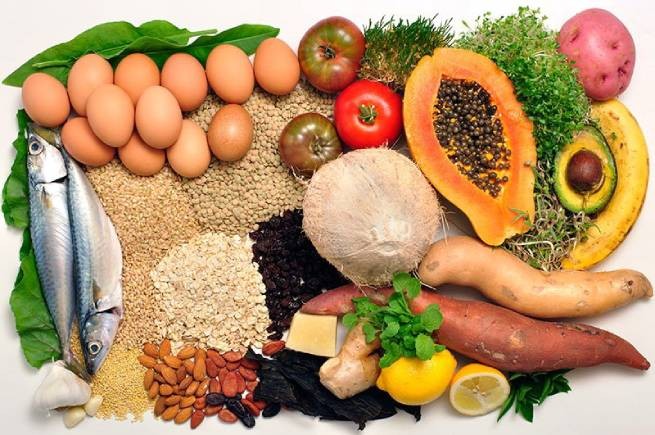13 healthy foods will help prevent thyroid disease and ensure its proper functioning.
An important mineral that is necessary for the proper functioning of the thyroid gland is iodine. Its deficiency causes serious diseases, but they can be prevented by enriching the menu with iodine. Important: Simply using iodized salt in your menu will not be enough! What to feed the thyroid gland? Its health will be ensured by healthy and tasty products.
Why does the body need iodine?
As a pure element, iodine is a dark, shiny stone or purple dye. Traces of it are found in soil and water, and iodine is also found in some foods, writes medaboutme.
Iodine is extremely important for thyroid health, it plays a major role in hormone production. The body does not produce it on its own, so it must be obtained from food. It has been proven that Getting enough of this valuable mineral in your diet helps improve your metabolism, brain health, and hormone levels.
Iodine deficiency can lead to hypothyroidism, brain damage, and enlargement of the thyroid gland to abnormal sizes. (goiter). If a woman has experienced iodine deficiency during pregnancy, the fetus has an increased risk of congenital anomalies.
According to experts from the WebMD portal, almost 1/3 of the world's population has a high risk of iodine deficiency in the body. The recommended daily amount of iodine depends on a person's age and gender. Average values:
- Children from birth to six months: 110 mcg.
- Children from seven months to one year: 130 mcg.
- Children 1 to 8 years: 90 mcg.
- Children 9 to 13 years: 120 mcg.
- Adolescents 14–18 years: 150 mcg.
- Adults: 150 mcg.
- Pregnant women: 220 mcg.
- Nursing mothers: 290 mcg.
Vegans and people who eat little dairy, seafood and eggs also need more of the mineral.
13 Foods That Are High in Iodine
Now about what you should definitely include in your diet. Fortunately, it is not difficult to get iodine from food, because many familiar products are rich in it:
Seaweed. According to the National Institutes of Health, it is considered one of the best sources of iodine. A 10-gram serving of dried nori seaweed will enrich the body with 232 mcg of iodine, which is almost 1.5 times the daily requirement. Nori is used to make sushi and seafood salads, and more.
Fish. High-quality fish is rich in useful substances, contains Omega-3 fatty acids, phosphorus, riboflavin and vitamin D. The most valuable sources of iodine are cod (158 mcg of iodine per 100 g of product), halibut (18 mcg) and pollock (1210 mcg).
Mollusks. Squid, crabs, scallops, oysters, shrimp and other types of shellfish, in addition to iodine, contain protein, vitamins and healthy fats. And at the same time, they are a dietary product – their caloric content is minimal. Due to the fact that mollusks absorb sea water, they are rich in iodine. One serving of boiled shrimp, for example, contains 13 mcg of iodine. Just 100 grams of boiled oysters can provide the body with 90 mcg of iodine, which is more than half the daily requirement for an adult.
Dairy products. The iodine content in them depends on whether the cows were given feed additives with this valuable substance. On average, one cup of milk contains 85 mcg of iodine. In addition, milk is a source of protein, calcium, phosphorus, vitamin D and group B. Dairy products – in the absence of health contraindications, of course – should be present in the diet every day.
Eggs. Scientists have proven that animal products are the richest sources of iodine, including eggs. One hard-boiled egg will provide the body with 26 mcg of iodine, as well as iron, folic acid, riboflavin, vitamins D and E, and high-quality protein. They can be eaten as a separate dish, or added to salads and soups, or used to make cocktails.
Iodized salt. Enriched with iodine, it is rightfully considered a healthy product. But it also has a downside. When consuming it, you should be careful, as excess sodium in the diet can lead to health problems. It is also important to understand that most of the salt in the diet does not come from a salt shaker, but from processed food. And iodized salt is very rarely used in its preparation. That is why it is not enough to have a salt shaker with the “right” salt on the table to replenish the iodine deficiency. By the way, the idea of saturating salt with iodine was first born in Switzerland in 1922.
Potato. The best is baked. Many people underestimate the value of potatoes, but they are rich in vitamin C, potassium and other nutrients. One medium baked potato contains about 60 mcg of iodine. If you want to increase this amount, you can sprinkle the potatoes with a small amount of cheeseIt also contains iodine.
Turkey breast. This bird is usually associated with the festive table at Christmas, but it should be served more often on the dinner table on weekdays. Moreover, you can cook a lot of healthy dietary dishes from the breast. In addition to high-quality protein, selenium and B vitamins, turkey contains a lot of iodine: 40 mcg in 100 g of the product.
Prunes. Dried plums contain more nutrients per gram of weight, as they are dehydrated. In addition to being high in fiber, which is good for digestion and can provide relief from constipation, prunes contain iodine. One serving of 5 prunes will provide 13 mcg of the mineral, or 9% of the daily value. Prunes as a food product appeared in the 6th century BC, when the Egyptians noticed that some fruits did not spoil in the sun, but dried, acquiring a different taste and useful properties.
Canned tuna. A 85 g can of tuna in oil contains 14 mcg of iodine, which is 11% of the daily requirement. At the same time, tuna is an excellent source of protein, Omega-3 fatty acids and vitamin D. It is a great snack for those who come home from work late and have no time to cook dinner. It is also useful to include tuna in salads and to complement cereal dishes.
Sea beans. It is worth noting that all types of legumes are healthy. Sea beans are no exception. They contain many vitamins and minerals, including iodine. A cup-sized portion of boiled sea beans will enrich the body with 30 mcg of iodine, which is slightly more than 20% of the daily requirement. Beans are easy to add to your diet: they can be used as one of the ingredients in a salad, as a filling for pies, added to soups and main courses.
Canned corn. It is often added to salads, it is tasty, juicy and nutritious. It goes well with many products, and therefore it is easy to introduce into the daily diet. Half a cup of canned corn will bring 14 mcg of iodine to the body, which is equal to 10% of the daily requirement.
Meat by-products. Previously considered food for the poor, today they are used to prepare dishes worthy of a festive table. Offal contains many useful substances, and its cost is often lower than that of meat. A 70-gram beef liver contains 32 mcg of iodine.
Expert nutritionists say it's not just iodine that matters
For optimal thyroid function, the body must receive all the necessary macronutrients (proteins, fats and carbohydrates) and micronutrients (vitamins and minerals), but some of them should still be emphasized.
The thyroid gland is very sensitive to severe calorie restriction.. When losing weight, you need to take this fact into account. Any strict diets can lead to changes in the functioning of the thyroid gland and, as a result, hormonal disorders. Although obesity can also provoke a malfunction of this important endocrine organ, leading to hypothyroidism – a decrease in the production of thyroid hormones.
To support thyroid function, you should increase your intake of certain nutrients:
- Iodine. If there is insufficient intake of it into the body, endemic goiter with hypothyroidism develops. Food sources of iodine: cod liver, seaweed, any sea fish, squid, shrimp, chicken egg yolk, legumes, milk, persimmon, blueberry, feijoa.
- Amino acid tyrosine – an important component for the synthesis of thyroid hormones. It is abundant in nuts, seeds, dairy products, parmesan, fish, beef, chicken and wild rice.
- Vitamin D regulates the thyroid gland, its deficiency is associated with its autoimmune diseases. Sources of vitamin: egg yolks, beef liver, fatty fish, fish roe, hard cheese, chanterelle mushrooms.
- Selenium. It is a part of the important enzyme deiodinase, which participates in the formation of the thyroid hormone thyroxine (T4). To get the required amount of selenium, you need to include fish (salmon, sardines, herring), Brazil nuts, chicken, turkey, garlic, eggs, mushrooms and other products in your diet every day.
- Iron. The thyroid gland is very sensitive to insufficient oxygen (hypoxia), any anemia can disrupt its functioning. Therefore, it is important to consume foods containing iron: red meat, offal, seafood, legumes, green leafy vegetables, whole grains. For optimal absorption of iron, it is necessary to include plant and animal sources in the diet, combine it with vitamin C (berries, greens, rose hips, pomegranate, etc.) and B vitamins.
- Vitamin B12. Deficiency anemia also affects the thyroid gland, leading to a decrease in hormone production and, as a result, a decrease in its function. Vitamin B12 deficiency is often observed in vegetarians, because the main sources of this vitamin are animal products: meat, fish, poultry, offal, seafood, hard cheeses.
For optimal thyroid function, the following are also necessary:
- Zinc. Found in seafood, oysters, liver, chicken, cheese.
- Vitamin A (retinol). Its sources are liver, eggs, butter, meat, poultry, cheese; orange vegetables and fruits, green leafy vegetables.
- Omega-3 polyunsaturated fatty acids. They are found in any fatty sea fish, fish roe, olive, hemp and other oils, flax and chia seeds.
A varied, balanced diet will help maintain the health of the thyroid gland for a long time. If any signs of disruption of its functioning appear, you should seek help from an endocrinologist who will prescribe the necessary examinations and treatment if necessary.







More Stories
Gambling: In the first half of 2024, the Greeks "put it on the line" 21.2 billion euros
"Death number" pedestrian on Iera Odos (video)
Traffic surveillance cameras never "don't go on vacation": fines of 200 euros